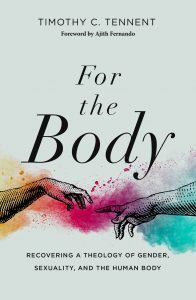For the Body: A New Resource by Timothy Tennent
November 17th, 2020Between September 5, 1979, and November 28, 1984, late Pope John Paul II preached a five-year series of weekly homilies on the theology of the body, which constitutes the landmark exposition of this theme. As wonderful as this resource is, it is theologically nuanced and not easily accessible to ordinary Christians who are facing these struggles in their families or workplaces. Christopher West promoted John Paul II’s teachings to a wider audience through his books Theology of the Body Explained, Theology of the Body for Beginners, and more recently in Our Bodies Tell God’s Story. However, these books stand as an exception to the rule. Most popular Christian books focus on a Christian response to same-sex marriage or offer advice on building positive marriages, but they have not been as robust in demonstrating how all of these issues point to a single theological problem that remains largely unaddressed. That single problem is that we do not have a coherent theology of the body.
In this book, I seek to demonstrate how a positive vision of the body that arises out of Scripture and the consensus of Christian teaching gives us a positive theological vision and, hopefully, a way forward for addressing the whole range of issues the church is facing today.
What the Church Has Believed, Taught, and Confessed
Traditionally, church doctrine referred to what was believed, taught, and confessed. However, the meaning of these terms has been largely lost as the church has become increasingly disconnected from its own history. Populist notions of Christianity must always be informed by the rich heritage we received from the New Testament witness and from those who have gone before us. The term believed did not simply refer to things you know in your head or trust in your heart; believed referred to all the ways faith extended itself bodily, whether through worship, service, or the morality of our own life and witness in the world. The word taught did not simply refer to the content of material taught in a new members class; it referred to the whole structure of Christian teaching, preaching, and proclamation that would resonate with biblical, apostolic faith. The word confessed referred to far more than a document such as the Apostles’ Creed or the Nicene Creed; it also referred to the church’s role in defending the faith against attacks, protecting the church from false teachings, and maintaining our unity with the historic faith (see Jaroslav Pelikan, A History of the Development of Doctrine, vol. 1, The Emergence of the Catholic Tradition (100–600) [Chicago: University of Chicago Press, 1971], 2–5).
This book seeks to address a doctrinal neglect in the church that has negatively influenced what is being believed, taught, and confessed. That problem has many manifestations, but the root problem is a deficient theology of the body. This is not some odd doctrine that dwells only in seminary classrooms or academic lectures but one that lies at the heart of many of the most pressing moral, cultural, and ecclesiastical issues of our day.
It is common today to hear of someone who has for most of their lives held to a traditional view of marriage, embark upon a journey that eventually led them to a new view concerning the definition of marriage or understanding of gender. These are often very powerful and moving stories. These stories normally involve getting to know someone personally who has struggled with their gender, or a happy lesbian couple who may have recently joined the church, and so forth. Like many who are reading this book, I have listened to these stories and reflected on them. But as I faced all of these new questions and issues, I also have been on a journey. I have spoken with friends, I have read books, I have studied Scriptures in a new way, and I have listened both to those who struggle with these issues and to the church throughout the ages, trying to better understand these issues. This book reflects some of my journey.
—
 This excerpt is taken from the introduction of Timothy Tennent’s new book, For the Body: Recovering a Theology of Gender, Sexuality, and the Human Body. Video companion and study guide forthcoming January, 2021.
This excerpt is taken from the introduction of Timothy Tennent’s new book, For the Body: Recovering a Theology of Gender, Sexuality, and the Human Body. Video companion and study guide forthcoming January, 2021.
This book is suitable for: 1) Pastors leading communities 2) Individuals seeking deeper study 3) Student ministers. In these pages readers will: 1) Understand why our bodies matter on a host of issues 2) Discover a positive vision for human sexuality 3) Be equipped to engage culture from a positive posture.
The human body is an amazing gift, yet today, many people downplay its importance and fail to understand what Christianity teaches about our bodies and their God-given purposes. We misunderstand how the body was designed, its role in relating to others, and lack awareness of the dangers of objectifying the body, divorcing it from its intended purpose.
In For the Body, author Timothy Tennent looks at what it means to be created in the image of God and how our bodies serve as icons that illuminate God’s purposes. Tennent examines topics like marriage, family, singleness, and friendship, and he looks at how the human body has been objectified in art and media today. He also offers a framework for discipling people today in a Christian theology of the body.
Feedback
Please fill out the form below if you would like to provide feedback to Dr. Tennent concerning this blog entry.


